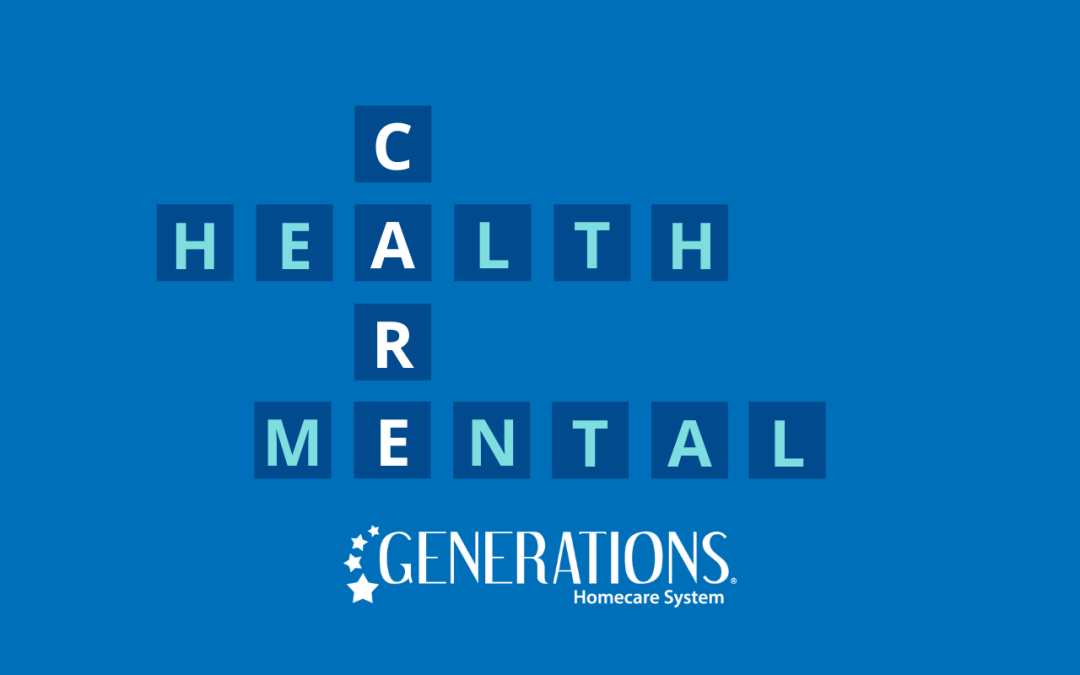According to the Anxiety and Depression Association of America, 40-70% of caregivers show symptoms of depression. This shocking statistic proves why mental health needs to be taken seriously and become a bigger discussion within the homecare community. As much as monitoring your own symptoms is important, employers also have a responsibility to provide the resources and education needed for a healthy mindset and work environment.
Caregiving can be tough work and may lead you to experience stress. Stress can take a toll on your body both physically and mentally and it’s important to know the signs. Common signs of stress include; weight loss/gain, substance abuse, tiredness, aches and pains, and headaches. Though there are many other signs of stress that can be found on the Cleveland Clinic website. Experiencing any stress factors for an extended period of time can lead to bigger issues that may affect mental and physical health.
To avoid an influx of stress, the National Alliance on Mental Health recommends “personalizing your self-care strategy”. First, determine how stress affects you and which situations put the most stress on you. Knowing which situations stress you allows you to better prepare yourself for them. Additionally, practice good physical health on a daily basis. This takes shape in many forms such as eating healthy and exercising daily. Even in the busiest times, it’s important to find time to do what brings you joy.
In an insightful article from the National Association for Home Care and Hospice, they discussed the trauma induced by the COVID-19 pandemic. As leaders, it can become difficult to support others through trauma while trying to support yourself at the same time. In the article, they also touched on two important terms: compassion satisfaction and compassion fatigue. Compassion satisfaction focuses on the fulfillment one receives from helping others through a tough time. Compassion fatigue on the other hand focuses on the draining of one’s emotions at the expense of helping someone else with theirs.
Although helping others is great, it should not be at the expense of your own mental or physical health. One of the best things a leader can do is acknowledge when they or someone needs help that may be outside of their realm of expertise. We recommend creating a mental health plan that allows your care team to find readily available sources of help. Let’s discuss some of the resources available:
Share Support Resources: Be prepared to provide support resources to members of your care team. This webpage from health.gov provides you with a list of both professional and volunteer services available to help those facing distress. This webpage is a great resource because it offers multiple solutions to help those being affected.
ADAA’s Online Support Group: Available in both English and Spanish, the Anxiety and Depression Association of America online support group is here to help. This online group is there for those struggling with anxiety and depression to share their experiences and get help. The support group allows people to connect with one another and encourages open discussions.
Suicide Prevention Lifeline: The National Suicide Prevention Lifeline works to connect people in distress to a trained professional there to help them. The free, confidential support is available 24/7. The Suicide Prevention Lifeline phone number is 988.
![]()
Staying connected with your team is an important element of maintaining a healthy workforce. Generations Homecare System takes pride in providing an easy-to-use and convenient software solution for care teams across the globe. Safety is always our top priority, which is why we provide the necessary communication tools that connect care teams. Here are some of the tools care teams are using to stay connected:
Mobile App: Caregivers can do their job with ease with the Generations Mobile App. Seamlessly communicate with office staff, other caregivers, and clients from within Generations giving you peace of mind. Caregivers have the ability to easily and securely document client information, making sure they are always in the know.
Secure Communication: Secure Communication in Generations Homecare System allows for messaging to take place in a centralized location. The Message Center within Generations stores messages by date, allowing for easy recall. Keeping your caregivers engaged with the entire care team helps everyone feel connected and work as a whole.
Document Management: Create a plan to share mental health resources with your care team. Easily and securely upload and share important documents with caregivers, care recipients, and administrators or office staff using Document Management. Additionally, be in control of who has access to these documents. The discussion surrounding mental health is an important one to have with your office staff, caregivers, and clients. Be sure to encourage your care team to take control of their mental health and know which resources are available to them. For more mental health resources, visit the National Institute of Mental Health website.

